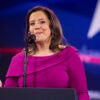President-elect Donald Trump’s public campaign to push U.S. companies to make their products in America is already having an impact, especially on one of his favorite targets: the auto industry.
On Tuesday, Ford Motor Co., the nation’s second-largest automaker, said it will cancel a plan to build a small-car assembly plant in Mexico that Trump has criticized, and instead expand a Michigan plant, creating 700 local jobs.
A few hours earlier, Trump had threatened to impose tariffs on cars built by General Motors Co. in Mexico, writing on Twitter: “Make in the U.S.A. or pay big border tax!”
The Daily Signal depends on the support of readers like you. Donate now
In response to Trump’s attack against GM for selling Chevrolet Cruzes assembled in Mexico to U.S. car dealers, America’s largest automaker quickly defended itself. GM noted that almost all of the 190,000 Cruzes sold here last year actually were made at a factory in Lordstown, Ohio.
Experts say these actions, even if not directly attributable to Trump, showcase potential changes ahead for the auto industry, a sector that is ascendant after selling a record 17.55 million new cars in the U.S. last year.
“It’s bullying, and I don’t think it’s a sustainable way to do business, but Trump’s approach is being reinforced,” Dan Ikenson, who researches international trade and investment policy at the Cato Institute, told The Daily Signal in an interview. “He hasn’t taken the oath of office yet, and he has affected hundreds of millions — if not billions — of dollars in investment decisions, and thousands of jobs.”
Observers of the auto industry contend that investment decisions made by companies such as Ford reflect long-term business goals more than influence from the incoming administration.
Ford Chief Executive Mark Fields said “the primary reason” his company scrapped a $1.6 billion factory slated for San Luis Potosi, shifting production to an existing plant in Mexico, “is just [that] demand has gone down for small cars.”
The new jobs in the Michigan plant, meanwhile, mostly will support Ford’s production of self-driving and electric cars, which the company expects to be popular in the future.
“The U.S. auto industry is clearly at the top of the best cycle we’ve ever had, and even before the presidential election, the industry is acting differently in response to that,” Bernard Swiecki, an analyst at the Center for Automotive Research in Ann Arbor, Michigan, told The Daily Signal in an interview. “We are now plateauing, meaning the building boom in Mexico will slow because the boom was designed to fill the need for capacity.”
Swiecki added:
I don’t think in any of these decisions Trump’s advocacy will be the main driver. The real driver will always be the business case. In the Ford decision, the business case lined up this way, and if at the same time you can curry some political favor with the president, you will take that.
No matter the motive, Swiecki and other experts say, the increasingly globalized auto industry is paying attention and taking the president-elect’s statements seriously.
Trump has vowed repeatedly to impose tariffs on vehicles imported into the United States from Mexico.
Trade experts agree that presidents have wide latitude to impose penalties on imports, at least temporarily, including restricting imports if they pose a national security risk under the International Emergency Economic Powers Act of 1977.
Edward Alden, who studies trade policy at the Council on Foreign Relations, argues that targeting a single company with a tariff would be more controversial, and unprecedented.
“There is nothing that prevents the president from claiming that Ford’s investing in Mexico constitutes a national industrial emergency and to move forward with sanctions,” Alden told The Daily Signal in an interview. “It would be a gross distortion of emergency power, but Trump has indicated he is not terribly constrained by norms and expectations.”
Trump also has frequently criticized and promised to renegotiate the North American Free Trade Agreement (NAFTA), a deal that went into force in 1994 under which the United States does not impose tariffs on products imported from Mexico and Canada.
Alden said that since the mid-1960s, the auto industry has been integrated across North American borders, starting with the Auto Pact of 1965, a trade agreement between the U.S. and Canada that allowed for tariff-free imports and exports.
“If you really try to create a build-it-in-America auto industry, you have to undo more than 50 years of history,” Alden said, adding:
The auto supply chain operates on a continental basis. If Trump blows that up by increasing the price of an imported vehicle with tariffs, it could reduce overall vehicle sales and cause manufacturers’ costs to increase substantially. This would force a massive restructuring of the industry.
Imported vehicles have become central to the American market, equaling more than 40 percent of annual volume.
Since the U.S. recession, automakers have committed big investments to new plants in Mexico to take advantage of cheap labor.
According to the Center for Automotive Research, of the 11 assembly plants announced to be built in North America since 2009, nine were planned for Mexico.
The nonprofit, independent research center reported that from 2013 to late 2016, carmakers invested $68.5 billion in North America, a total that includes new plants as well as expansions and updates to existing facilities.
Seventy-two percent, or $49.4 billion, of that investment went to the U.S.
While American car companies say they have moved jobs to Mexico to remain competitive, they also invested in the U.S., creating jobs in design and engineering or in plants making parts for Mexican factories.
“The idea that something is made in the U.S. or made in Mexico is an outdated notion,” Bryan Riley, a trade policy analyst at The Heritage Foundation, told The Daily Signal. “With cars, whether final assembly is in the U.S., Mexico, or somewhere else, you have components from all over the world.”
Riley added:
That is something that benefits Americans. You don’t want to go on a path that we are better off if we make everything in the U.S. We are much better off to say Americans have the freedom to spend and invest money where they want, and no one in Washington, D.C., should be interfering with those decisions.




























